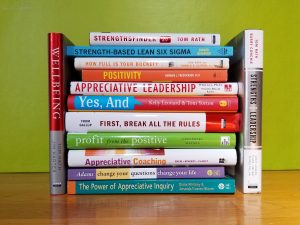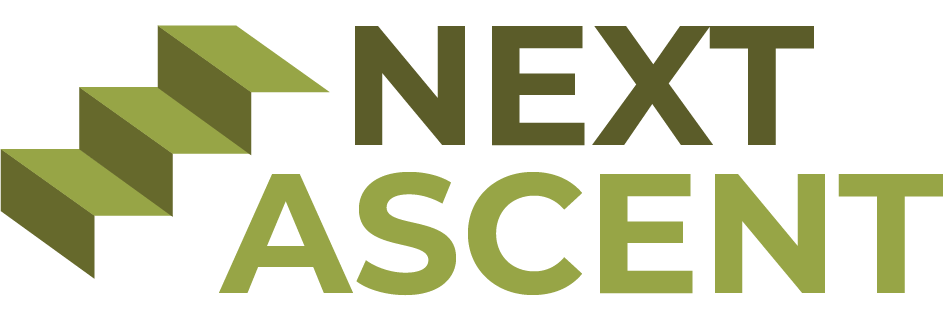 Our Favorite Resources
Our Favorite Resources
We are often asked to share our favorite resources that underpin our strength-based methodologies. So, here you go, some of our favorites and why. For simplicity sake, all books are linked to Amazon.com, but that is certainly not the only source for these books.
Appreciative Inquiry is the foundation of everything we do…so it is purposefully at the bottom of the stack of books in the picture.
The Power of Appreciative Inquiry: A Practical Guide to Positive Change, Diana Whitney and Amanda Trosten-Bloom
The authors define Appreciative Inquiry as “the study and exploration of what gives life to human systems when they function at their best.” This is our go-to book for anyone interested in the principles and practice of Appreciative Inquiry for organization development and growth. “By reading this book you will learn to apply the power of Appreciative Inquiry in unique and creative ways; and in so doing, will transform organizations into centers of creativity, innovation, and life that can benefit the world and all living beings.”
The Thin Book of SOAR- Building Strengths-Based Strategy, Building Strength-Based Strategy, Jacqueline Stavros, et al
This is our go-to book for our strategic planning client engagements. It is short (48 pages), very readable, and delivers what the authors promise—“This Thin Book is about a profoundly positive Appreciative Inquiry based approach to strategic thinking and planning that allows an organization to construct its future through collaboration, shared understanding, and a commitment to action.”
We are guided by the power of Strengths. We not only rely on our own individual strengths as consultants/facilitators, we also seek to amplify the strengths of those we work with for maximum success. The stack of books is flanked by three Gallup/Tom Rath books. Imagine our excitement when we recently heard him speak in person at the Gallup Strengths Summit in Omaha, NE!
StrengthsFinder 2.0, from Gallup and Tom Rath
This book by Tom Rath, New York Times bestselling author, is our go-to book for understanding the history of the Clifton StrengthsFinder assessments rooted in more than 40 years of strengths research. Part I first makes the case for building on strengths for individual, team and organizational excellence and then explains the use of the Strengths Finder assessment to identify one’s top five themes of talent and to understand their unique Strength Insights. Part II describes each of the 34 talent themes and provide ideas and action plans to build those talents into strengths.
Strengths Based Leadership: Great Teams, Great Leaders and Why People Follow, from Gallup and Tom Rath
This is our go to book for helping our clients become more effective leaders using the following three evidence-based practices: (1) “knowing your strengths and investing in others’ strengths”, (2) “getting people with the right strengths on your team”, and, (3) “understanding and meeting the four basic needs (e.g. build trust, show compassion, provide stability and create hope) of those who look to you for leadership”. Tom Rath, #1 New York Times bestselling author, and Barry Conchie, renowned leadership consultant, reveal the results of years of Gallup research and provide a strengths-based road map for leading people, teams and organizations toward a better future.
Wellbeing: The Five Essential Elements, Tom Rath and Jim Harter
This book is for those of us who want to improve our wellbeing and have thriving work and personal lives. Using the results of a comprehensive study of people in more than 150 countries, the authors statistically develop five universal interconnected dimensions (e.g. Purpose, Social, Financial, Physical Health and Community) of wellbeing, a Wellbeing Finder assessment to track and improve wellbeing, and strategies for having “thriving” wellbeing in each of these dimensions.
First, Break All the Rules – What the World’s Greatest Managers Do Differently, From Gallup
In First, Break All the Rules, one of Gallup’s first (1999, updated an re-published in 2016) survey research based books, the authors, both Gallup Organization associates, reveal what the world’s greatest managers do differently. Using observations from 80,000 interviews with managers over the previous 25 years, the authors focused their attention on the great managers, those “who excelled at turning each individual employee’s talent into high performance” and discovering their answers to the following questions. “What will talented employees always need? What will great managers always do to turn talent into performance? What are the enduring secrets to finding, focusing, and keeping talented employees?” The authors found that the “simplest and most accurate way to measure the strength of a workplace” was twelve questions. This book is the first to prove the link between the employee Q12 engagement survey results and organizational performance. The re-released version of the book includes access to the Clifton StrengthsFinder assessment and the Q12 employee engagement survey.
There are a number of other organizational and individual development books that are regular go-to books.
Appreciative Leadership: Focus on What Works to Drive Winning Performance and Build a Thriving Organization, Diana Whitney and Amanda Trosten-Bloom
The subtitle of this book, Focus on What Works to Drive Winning Performance and Build a Thriving Organization, concisely summarizes the “why” and “how” the authors chose Appreciative Inquiry as the positive change framework for describing the Five Core Strategies of great leadership, which they call Appreciative Leadership—“the relational capacity to mobilize creative potential and turn it into positive power…to make a positive difference in the world.” The book is written for the reader, in short sections, providing tips and key practices throughout for becoming an appreciative leader of a thriving organization.
Positivity, Barbara Fredrickson
While the claims in the subtitle of this book, Top-Notch Research Reveals the 3-to-1 Ratio That Will Change Your Life, have been questioned by some other researchers, Professor Fredrickson’s message that “you’ve all got what it takes to reshape your life and the world around you for the better…Heartfelt positivity” is a central and well-established tenet of positive psychology. The book describes the good news about ten forms of positivity and provides practices for raising your ratio for building pathways to improve your life.
Profit from the Positive: Proven Leadership Strategies to Boost Productivity and Transform Your Business, Margaret Greenberg and Senya Maymin
The subtitle of this book, Proven Leadership Strategies To Boost Productivity And Transform Your Business, is to the business leader what Positivity by Professor Frederickson is to the individual—a groundbreaking guide for using positive psychology strategies to improve life. The authors, both educated and trained in positive psychology and sought-after executive coaches, translate the scientific research into practical strategies written with the busy leader in mind.
Yes, And – How Improvisation Reverses “No, But” Thinking and Improves Creativity and Collaboration, Kelly Leonard and Tom Yorton
The authors, two Second City executives, of this engaging, witty and highly practical book describe how anyone can apply the tools of improvisation to become a more compelling leader and a more collaborative follower. They describe how the seven elements of improv can be employed to “improve your emotional intelligence, increase creativity, and learn to pivot out of tight and uncomfortable situations.”
Strength-Based Lean Six Sigma: Building Positive and Engaging Business Improvement, David Shaked
This book is written for “advanced practitioners of Lean Six Sigma or any of the other strength-based approaches” to business change and improvement. Strength-based Lean Six Sigma “combines the rigour of Lean Six Sigma with the innovation and energy of Appreciative Inquiry and other strength-based approaches to organizational change.”
Change Your Questions, Change Your Life: 12 Powerful Tools for Leadership, Coaching, and Life, Marilee Adams
The author uses a fable about Ben, the “Answer Man,” to show how the Question Thinking (QT) process and tools can help us have better lives at home and at work. The first edition became a word-of-mouth bestselling book shared among friends and across corporate leadership teams. QT can guide “us in designing new questions for getting better results…helps us think productively rather than reactively, and to choose wisely rather than simple react.” Discover the power of Question Thinking.
How Full is Your Bucket? Expanded Anniversary Edition, Tom Rath and Don Clifton
This easy and memorable read is a #1 New York Times bestseller by Tom Rath in collaboration with his grandfather, Don Clifton, the recognized Father of Strengths Psychology. The simple but powerful bucket metaphor “reveals how even the briefest interactions affect your relationships, productivity, health and longevity” by either filling or dipping from our bucket. Grounded in decades of research, the authors provide powerful strategies for increasing the positive moments in your work and lives.
Appreciative Coaching: A Positive Process for Change, Sara Orem, et al
This book is written for coaches who wish to “discover new ways to flourish in their practices and with their clients by affirming and recognizing a spirit of inquiry that brings forth the best in others.” The authors draw on their experiences with and knowledge of Appreciative Inquiry to present an Appreciative Coaching method consisting of the four AI stages of Discovery, Dream, Design, and Destiny. The book provides sufficient explanations for coaches unfamiliar with AI principles, underlying theories, four stages, sample questions and vignettes for incorporating Appreciative Coaching into any existing coaching practice.
